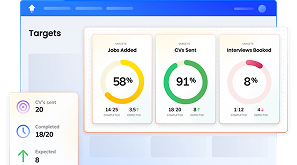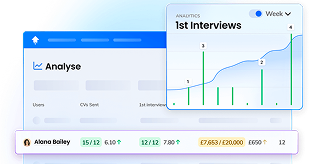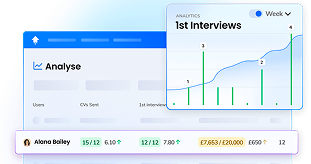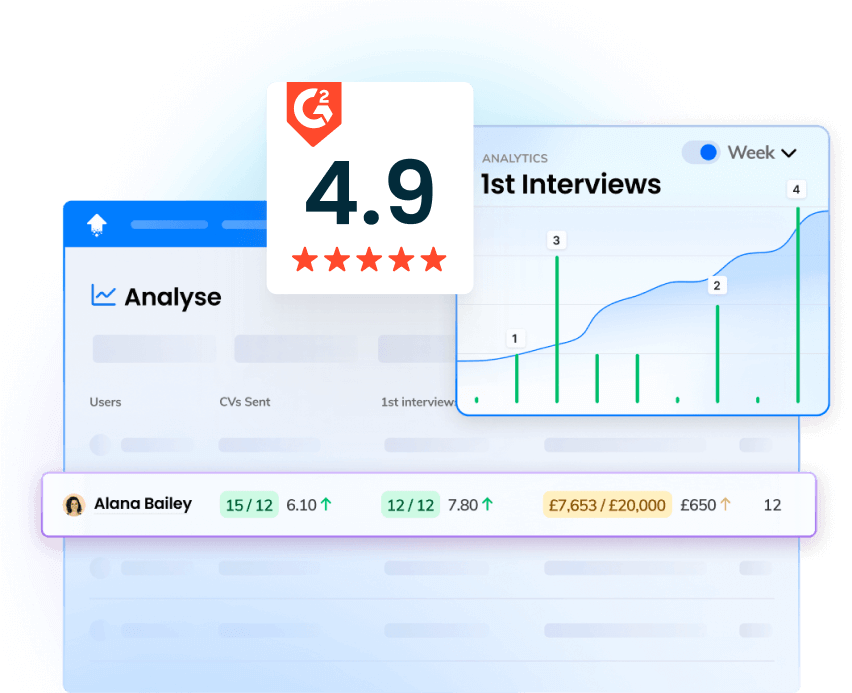Candidate sourcing is all about finding and identifying potential candidates for a job — often before they even apply.
In today's fiercely competitive job market, it's not just about waiting for applications to roll in.
Indeed, to stay ahead of the competition, agencies must actively seek out top talent and build and nurture strong talent pools before the job is even added.
Mastering sourcing is vital for recruitment agencies of any size because it helps build a strong pipeline of candidates, speeds up the recruitment process, and ensures they're always a step ahead in finding the best fit for their clients' roles.
This, in turn, helps agencies to delight their clients and build a strong reputation.
Read on to find out everything you need to know about candidate sourcing for recruitment agencies, including five effective strategies and a handy step-by-step guide to the process.
What is Candidate Sourcing?
Candidate sourcing is all about getting ahead and building a strong talent pool.
It is the proactive process of identifying and finding potential job candidates, often before they apply for a role — or before the role has even been added to your agency.
Sourcing falls into two categories:
- Active sourcing, which means looking for candidates who are actively seeking new roles
- Passive sourcing, which focuses on finding those who aren't on a job hunt right now but could be a perfect fit
Recruiters rely on a wide variety of sourcing channels when seeking out top talent.
Some of the most popular sourcing channels include:
- Job boards
- Niche industry platforms
- Networking events
- Hosting events
- Partnerships
- Referrals
- Online groups, communities and forums
Meanwhile, platforms like an applicant tracking system (ATS) and CRM help streamline the process, making it easier to organise and contact potential candidates.
And in 2024, many recruiters lean on AI-powered software for more accurate, data-driven candidate matching.
The Benefits of Candidate Sourcing for Recruitment Agencies
Recruiters are often pushed for time, which means not every recruitment agency practices sourcing.
But in 2024, this is a mistake.
Sourcing may take longer in the short term, but it will save time in the long run and deliver superior results.
Here are five of the top benefits agencies can expect to see when they launch a candidate sourcing process:
#1 Build a Stronger Talent Pipeline
A stronger talent pipeline is the single biggest benefit of developing a proactive candidate sourcing strategy.
If you wait for applications and CVs to be submitted, you only have a small pool of talent to choose from.
And it will take time to screen and qualify those applicants.
With candidate sourcing, you proactively identify potential candidates before roles even open.
By regularly engaging with active and passive candidates, recruiters can create a diverse pool of qualified talent and ensure they're always prepared to fill positions quickly and efficiently.
#2 Access Untapped Talent Pools
In traditional recruitment, recruiters wait for candidates to come to them.
This method will not necessarily lead you to the best match for the role.
With candidate sourcing, recruiters have to get creative, tapping into new channels that give them access to high-quality talent they would never have otherwise encountered.
Creative ideas for recruitment sourcing include actively searching platforms like LinkedIn, online communities, and niche networks.
This will allow you to build a stronger and more diverse talent pool, leading to better outcomes for candidates and clients.
#3 Align Recruitment Efforts With Broader Business Goals
Whether your agency is aiming to expand into a new industry or focus on a specific type of role, every agency has a plan for the future.
But to achieve your smart goals for recruitment agency expansion, you need to have the right candidates ready to go.
For example, say you've traditionally been a generalist agency, hiring into every industry, but now want to specialise in medicine.
It will be much easier to attract medical clients if you already have qualified candidates ready to fill their roles.
Furthermore, proactive sourcing can also help agencies to support their clients' business goals.
By understanding clients' business aims and culture, agencies can tailor their sourcing strategies to deliver candidates who will contribute to achieving these broader goals.
#4 Reduce Recruitment Costs and Time-To-Hire
By building a robust talent pool in advance, you save on recruitment costs and reduce your Time-To-Hire.
Here's how.
With a pool of qualified and engaged potential candidates ready to go, agencies can fill roles much more swiftly — enabling them to take on more clients and generate more revenue.
Furthermore, a healthy sourcing process reduces the time and money spent advertising and screening candidates.
#5 Stay Ahead of Competitors by Reaching Passive Candidates
Another huge benefit of sourcing candidates is that it allows you to reach passive professionals who are not actively job-hunting but are open to new opportunities.
By engaging with these individuals early and building relationships, agencies can secure top talent before others even have a chance, giving them a valuable edge in the market.
The Candidate Sourcing Process: A Step-by-Step Guide
The benefits of sourcing candidates are crystal clear.
But where to start?
Here's how to structure your candidate sourcing process in seven steps.
#1 Define Job Requirements and Ideal Candidate Profiles
Start by considering job requirements and developing your ideal candidate profiles in response.
These job requirements may be for roles that you hire into regularly or for the type of future job openings you would like to recruit for.
Consider the skills and experience required for that type of role, as well as your clients' company cultures.
Use this profile to guide sourcing, ensuring you attract candidates who meet the job specs and align with your organisation's values.
#2 Select Sourcing Channels
Next, consider where you're most likely to find top talent for these roles.
To gain a competitive edge, it's important to consider niche channels alongside more traditional options.
Sourcing channels can include:
- LinkedIn, X, and other social media platforms
- Job boards such as Indeed and Monster
- Niche industry forums, groups, and websites
- Professional associations and networks
- Employee referrals
- Recruitment events and job fairs
- Company career pages
- Talent pools and databases
- Alumni networks and university career centres
- Partnerships with educational institutions
- Industry-specific groups and communities
#3 Craft a Compelling Outreach Strategy
Consider how you are going to reach out to potential candidates you identify.
Develop a standardised communication sequence — for example, an initial message through the sourcing channel, followed by an email, followed by a phone call.
Consider also whether you can develop valuable assets—such as industry-relevant ebooks or free digital tools—to share with these potential candidates and get them interested in your agency.
In 2024, it's essential to personalise this communication, ensuring you are conveying genuine interest and potential candidates feel valued.
If you're approaching candidates with a specific role, highlight what makes the opportunity exciting.
Focus on the candidate's strengths and how they align with the role, and clearly communicate the benefits and unique aspects of the position.
#4 Engage Passive Candidates
Engage passive candidates by building genuine relationships and offering valuable insights into industry trends and opportunities.
These insights could be delivered via blog content on your website, social media posts, regular email newsletters, ebooks, whitepapers, and more.
It's also important to personalise outreach with tailored messages highlighting how the role aligns with the candidate's career aspirations and maintain regular, meaningful contact to keep them interested and informed.
#5 Build a Talent Pipeline
Building your talent pipeline means keeping a well-organised database of promising profiles and regularly nurturing these relationships.
Ensure you consistently engage with potential candidates and track their careers—and whether they're open to new opportunities—even when there aren't immediate openings.
This ensures a steady stream of qualified candidates when roles do arise.
#6 Screen and Qualify Sourced Candidates
To screen and qualify sourced candidates, conduct thorough initial assessments, including reviewing CVs from job seekers and conducting preliminary interviews.
Assess candidates' skills, experience, and cultural fit through structured questions and relevant assessments.
It's also essential to verify references and align their qualifications with the job requirements to ensure a strong match.
#7 Maintain a Talent Database for Future Needs
Just because a candidate doesn't secure a role or has decided to stay with their employer doesn't mean all your hard work needs to go to waste.
You've already screened and qualified the potential candidate — and they may be a perfect fit for a future role.
Build a talent database for potential candidates and regularly update career and contact information.
This way, you have a growing pool of screened and qualified candidates and their contact information to tap into whenever needed.
Challenges of Candidate Sourcing
There are several tricky challenges recruiters face while sourcing candidates.
Here are four of the biggest obstacles you should prepare to navigate.
#1 Increased Competition For Top Talent
In today's hyper-competitive market, recruiters and employers are already aware of the top candidates in their industry and may be making an effort to recruit them.
This makes proactive sourcing all the more important if you're to secure top talent.
However, it also decreases the time recruiters have to engage potential hires, which means your team needs to constantly network to ensure they're aware of — and engaging with — top talent.
Recruiters must also work with clients to differentiate their offers and encourage them to offer market-leading salaries.
#2 Difficulty in Sourcing Diverse Candidates
A diverse team is a strong team, bringing a wide variety of strengths, skills, and perspectives to the table.
However, recruiters must often work harder to find diverse candidates who may not be available via traditional sourcing channels.
Recruiters must reach underrepresented groups by diversifying their sourcing challenges.
Consider partnering with schools, colleges, universities, professional groups, and diversity-focused organisations, and advertise on platforms promoting inclusion.
It's also important to source from social media and niche forums and groups.
And ensure job descriptions are inclusive to ensure roles attract a broader range of applicants.
#3 Overcoming Technological and Automation gaps
Recruitment technology is developing rapidly, with new AI and recruitment automation tools constantly emerging.
Acquiring the latest tools hands you a competitive edge, delivering better outcomes while saving your recruiters time.
Working on outdated systems can hinder efficient candidate searches and limit access to talent pools.
To succeed in 2024, recruiters need data-driven tools and automation.
Remember—new tools must be seamlessly integrated into your existing tech stack, and recruiters must receive training on how to use them effectively.
#4 Balancing Outreach While Keeping Candidate Experience Positive
When sourcing, it's vital that recruiters master walking this fine line.
On one hand, effective sourcing depends on widespread and regular communication—first, reaching out to potential candidates and then keeping them engaged.
On the other hand, constant communication from a recruiter—especially when you're not actively job-hunting—can be irritating and stressful.
This is why it's important to personalise communication — and to read the room.
If a candidate tells you they're happy in their role and definitely not looking for a new job at the moment, wait a few months before re-engaging with them.
What's more, give them the option to decide how much communication they receive by launching a newsletter or sending them a link to your social media channels.
Effective Candidate Sourcing Strategies for Recruitment Agencies
So, how do you source candidates to overcome the challenges listed above?
And which recruitment sourcing strategies are reaping success for agencies in 2024?
#1 Use AI Tools to Enhance Sourcing Efficiency
AI tools enhance sourcing efficiency by automating candidate screening, analysing large talent pools, and matching suitable candidates based on skills and experience.
This sophisticated tech can identify patterns, reduce bias, and streamline repetitive tasks like CV sorting, allowing recruiters to focus on engaging with high-potential candidates more quickly and effectively.
This gives your recruiters more time to focus on the human-led tasks they shine at, such as engaging with candidates and clients.
#2 Leverage Social Media and Niche Job Boards
If you truly want to find the best of the best, you can't rely on traditional methods of sourcing candidates, such as large job boards or CV databases.
Instead, use LinkedIn recruiter and perform searches across other social media channels, such as X (Twitter) and Instagram.
Some social media platforms, such as LinkedIn and Facebook, also have professional groups containing concentrated groups of industry talent.
Niche industry job boards are another effective option — especially when recruiting into highly skilled professions.
#3 Optimise Job Descriptions for Candidate Attraction
When it comes to job descriptions, use clear, inclusive language that highlights key responsibilities and required skills.
Focus on the impact of the role, avoid jargon, and emphasise growth opportunities.
Ensure the description reflects company values and culture to engage diverse candidates while keeping the content concise and engaging.
It's also worth A/B testing job descriptions to see which structure, language, or writing style brings in the best matches for roles.
You can then apply these data-supported learnings to writing job descriptions going forward.
#4 Build Relationships with Universities and Professional Organisations
When you partner with educational institutions or professional organisations, you gain access to a ready-made talent pool.
Partnerships with schools, colleges, and universities help you discover up-and-coming talent recommended by teachers and professors.
These potential candidates are about to graduate, meaning they'll be keen to secure a job in the near future.
Through partnerships, recruiters can begin engaging these potential candidates ahead of the competition.
For more senior roles, professional organisations are an effective sourcing route.
The people connected to these organisations are likely to be key players within their industry, be highly engaged with their profession, and — even if they're not suitable for your role — know someone who is.
#5 Personalise Candidate Outreach
In 2024, candidates demand personalised outreach.
Deliver anything less, and you risk making candidates feel devalued or as if you're not truly interested in what they have to offer.
Instead, recruiters should make it clear they have candidates' best interests at heart and focus on building genuine relationships with them.
Top tips for personalisation include:
- Address candidates by name
- Reference specific skills or experiences from their CV or LinkedIn profile
- Highlight why they're a great fit for the role and company
- Mention shared interests or values between the candidate and the organisation
- Tailor messaging based on the candidate's career goals or industry trends
- Provide personalised details about the role's potential impact on their career
- Offer a flexible time for a call or meeting to suit their schedule
- Follow up with thoughtful, tailored communication rather than generic messages
- Send candidates content that will be of genuine value to them
How OneUp Can Help Recruitment Agencies with Candidate Sourcing

Successful candidate sourcing hinges on having the most effective recruitment tools in your arsenal.
Recruitment analytics software OneUp delivers performance tracking, gamification for motivation, and seamless integration — all of which can significantly boost your sourcing efforts.
Here's how.
#1 Performance Tracking

With OneUp, you can tap into the power of performance-based recruitment.
Custom dashboards and reports with intuitive visualisations give a clear overview of the number of candidates sourced, the number of interviews conducted, and overall conversion rates.
OneUp's automated reports feature allows you to build a report once and automatically send it to your inbox whenever needed.

This visibility helps you identify which sourcing strategies deliver results and where improvements are needed.
Furthermore, by understanding individual team member performance, agencies can adjust their approach to focus on high-performing strategies while optimising or revisiting those that aren't delivering the desired outcomes.
#2 Gamification for Motivation

With built-in gamification features, OneUp helps recruitment teams stay engaged and motivated, turning the often tedious candidate sourcing process into a rewarding challenge.
Tap into the power of leaderboards which display each recruiter's live progress towards a goal alongside their colleagues, or missions and challenges, which encourage collaboration.
What's more, you can automate celebration anthems or broadcast messages when a recruiter hits a goal for extra motivation.
#3 Seamless Integration

OneUp works seamlessly with recruitment CRMs, providing a smooth experience for agencies looking to improve their sourcing outcomes without overhauling their current systems.
Once set up, One-Up will automatically pull real-time data from across your tech stack to provide a single source of truth around recruiter performance.
Take a look at OneUp's vast range of integrations here.
Candidate Sourcing Tools to Use
As outlined above, the strength of your tech stack is key when it comes to sourcing success.
Effective sourcing tools include:
- CRMs like Bullhorn and JobAdder
- Applicant tracking systems (ATS) like Recruitee and Zoho Recruit
- AI-powered sourcing platforms like Workable and Manatal
- Recruitment analytics software like OneUp
- Social media management tools like LinkedIn Recruiter and Paiger
Conclusion: The Future of Candidate Sourcing for Agencies
Adopting the right candidate sourcing strategies is essential for attracting top talent, ensuring diversity, and staying competitive in the job market.
Effective strategies streamline the hiring process, reduce Time-To-Fill, and improve candidate quality by targeting the right talent pools and utilising modern tools like AI for efficiency.
OneUp's advanced analytics and performance tracking features empower recruitment agencies to streamline candidate sourcing, getting you those all-important results faster.
Ready to reap the rewards of a sophisticated candidate sourcing strategy? Find out how OneUp can help by booking a demo here today.



















